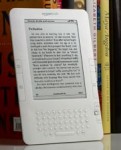Peter Glaskowsky has an analysis of DRM over at CNET that essentially makes the following claim about DRM — Kindle owners and iTunes store users don’t have a problem with DRMed e-books/music, therefore DRM “is commercially practical and acceptable to consumers.” Ugh.
Glaskowsky oversells how willing consumers are to buy DRMed music. Obviously if there were no problem at all with DRMed music, then Amazon itself would not be in the business of selling DRM-free MP3s. In fact, Amazon’s tagline on its MP3 downloads area is “Play Anywhere, DRM-Free Downloads.”
But, of course, when it comes to the Kindle, when you buy a book for Amazon’s e-book reader you are essentially not buying the book but rather simply renting it until Amazon decides to stop supporting the platform. I’m not surprised that Glaskowsky’s anecodtal evidence tells him that no one really minds this. That’s because the evil nature of DRM schemes really don’t come into play until the user wants to leave for another platform and finds out that’s impossible.
This happened with the Rocket eBook, of course. Lots of book fans paid the outrageous price for that e-book reader and then bought lots of content for it, only to find themselves lock out of the books they thought they had bought when Rocket went belly up. Not to mention those suckers customers who paid for Mobipocket DRMed ebooks (Mobipocket is the basis for the DRM in the Kindle) only to find themselves locked out of their books for awhile last year when Mobipocket’s DRM server was down for an extended period of tiem.
The same thing will happen eventually to Kindle owners — another platform will come along from Sony or someone else and they’ll think about switching until they realize every electronic book they own is locked to their Kindle.
Consider how music and e-book DRM works compared to a DRM system that does genuinely work — the DRM system that is used in DVDs. I buy DVDs even though they are DRMed because despite the DRM I can pretty much be guaranteed that they will work on any DVD player I choose probably for much longer than the effective lifetime of the DVD itself. I still don’t like DRM on my DVDs, but it is a minimal hassle.
Now imagine we had the sort of DRM that Glaskowsky finds perfectly acceptable for books applied to DVDs. DVDs would be tied to a single manufacturer’s system. When my Sony DVD player broke, I wouldn’t be able to just go out and buy a new DVD player from any manufacturer since my DVDs would only work on Sony’s system. If I want to get that cheaper DVD player with more features from Amazon, I could, but I’d have to repurchase every movie I own on Amazon-branded DVDs.
Now, the first year Sony released its DVD player and I rushed out and bought DVDs I probably wouldn’t care about the brand-specific DRM. It works great, I don’t have any problems with my playing my movies. Aha, Glaskowsky would say, this just proves that DRM is a grand idea and only crusty old ideologues would have any problem with this system. Of course, the second my DVD player breaks and I realize my DVDs are tied to Sony-only, I might have a much different conclusion. In fact, like many consumers, I might even be shocked to learn that my Sony DVDs won’t play on Amazon DVD players.
I have a Kindle and I use it all the time. But I wouldn’t waste a dime on a Kindle-only book, anymore than I would buy a Sony-only DVD, or a Jensen-only CD.
And the kicker, of course, is that the best thing that can be said about DRM is that it is an annoyance to legitimate customers. It does little at all to forestall piracy. Almost all of the Kindle-only DRMed content is easily available in DRM-free formats if you know where to look.
It is a strange system that essentially punishes only the honest people who actually step up and pay for content, while posting at most a minor annoyance for those who could care less and simply pirate whatever they want to see, read, hear.
But I suspect that objection is a bit too “philosophical” against Glaskowsky’s anecdotal evidence about how people feel about DRM on their Kindle less than a year after it’s release.
 So Amazon finally announced its long-rumored Kindle 2 which appears to be just like the original Kindle only 25 percent more of everything.
So Amazon finally announced its long-rumored Kindle 2 which appears to be just like the original Kindle only 25 percent more of everything.